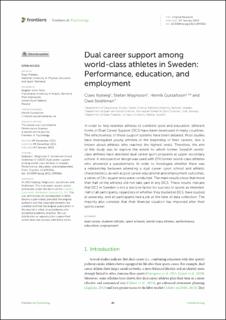| dc.contributor.author | Nyberg, Claes | |
| dc.contributor.author | Wagnsson, Stefan | |
| dc.contributor.author | Gustafsson, Henrik | |
| dc.contributor.author | Stråhlman, Owe | |
| dc.date.accessioned | 2023-05-03T18:54:26Z | |
| dc.date.available | 2023-05-03T18:54:26Z | |
| dc.date.created | 2023-03-06T09:41:26Z | |
| dc.date.issued | 2023 | |
| dc.identifier.citation | Frontiers in Psychology. 2023, 13, Artikkel 1093562. | en_US |
| dc.identifier.issn | 1664-1078 | |
| dc.identifier.uri | https://hdl.handle.net/11250/3066061 | |
| dc.description | This is an open-access article distributed under the terms of the Creative Commons Attribution License (CC BY). The use, distribution or reproduction in other forums is permitted, provided the original author(s) and the copyright owner(s) are credited and that the original publication in this journal is cited, in accordance with accepted academic practice. No use, distribution or reproduction is permitted which does not comply with these terms. | en_US |
| dc.description.abstract | In order to help talented athletes to combine sport and education, different forms of Dual Career Support (DCS) have been developed in many countries. The effectiveness of these support systems have been debated. Most studies have investigated young athletes in the beginning of their careers, less is known about athletes who reached the highest levels. Therefore, the aim of this study was to explore the extent to which former Swedish world-class athletes have attended dual career sport programs at upper secondary school. A retrospective design was used with 274 former world-class athletes who answered a questionnaire. In order to investigate whether there was a relationship between attending a dual career sport school and athletic characteristics, as well as post career educational and employment outcomes, a series of Chi-square tests were conducted. The main results show that more than half of the athletes did not take part in any DCS. These results indicate that DCS in Sweden is not a decisive factor for success in sports as intended. Half of all participants, regardless of whether they studied at DCS, have studied at university, and all participants had a job at the time of data collection. The majority also consider that their financial situation has improved after their sports career. | en_US |
| dc.language.iso | eng | en_US |
| dc.subject | dual career | en_US |
| dc.subject | education | en_US |
| dc.subject | employment | en_US |
| dc.subject | performance | en_US |
| dc.subject | sport schools | en_US |
| dc.subject | student-athlete | en_US |
| dc.subject | world-class athetes | en_US |
| dc.title | Dual career support among world-class athletes in Sweden: Performance, education, and employment | en_US |
| dc.type | Peer reviewed | en_US |
| dc.type | Journal article | en_US |
| dc.description.version | publishedVersion | en_US |
| dc.rights.holder | © 2023 Nyberg, Wagnsson, Gustafsson and Stråhlman | en_US |
| dc.source.pagenumber | 9 | en_US |
| dc.source.volume | 13 | en_US |
| dc.source.journal | Frontiers in Psychology | en_US |
| dc.identifier.doi | 10.3389/fpsyg.2022.1093562 | |
| dc.identifier.cristin | 2131398 | |
| dc.description.localcode | Institutt for idrett og samfunnsvitenskap / Department of Sport and Social Sciences | en_US |
| dc.source.articlenumber | 1093562 | en_US |
| cristin.ispublished | true | |
| cristin.fulltext | original | |
| cristin.qualitycode | 1 | |
